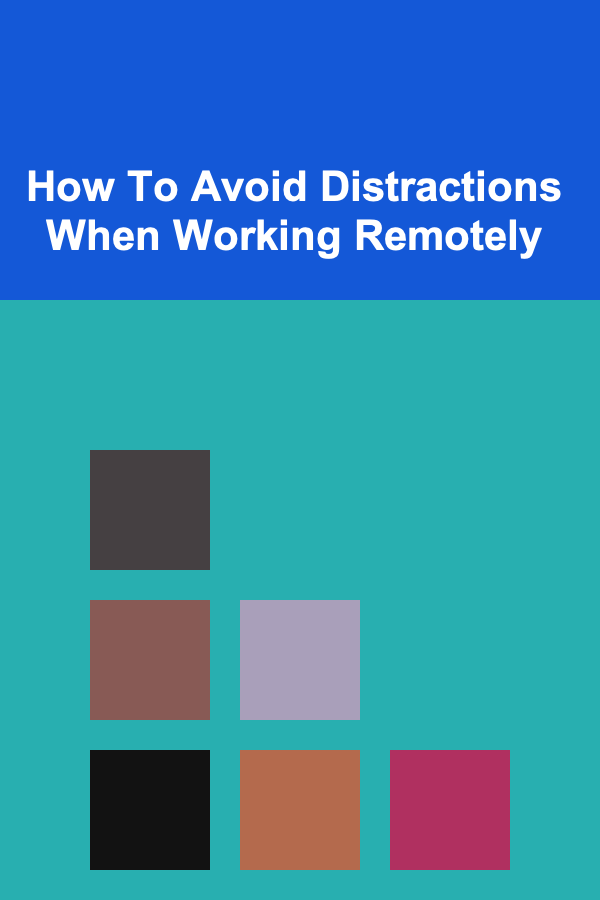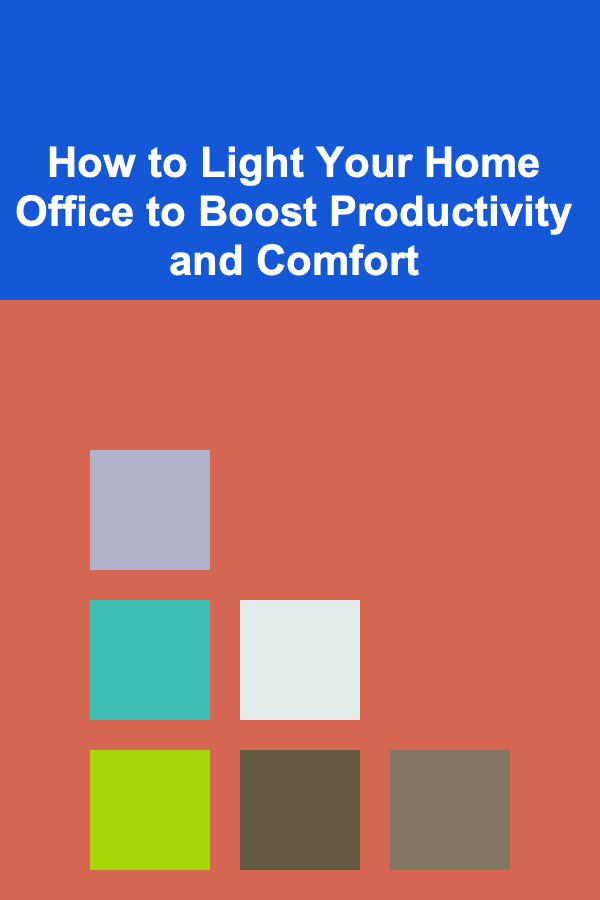
How To Avoid Distractions When Working Remotely
ebook include PDF & Audio bundle (Micro Guide)
$12.99$6.99
Limited Time Offer! Order within the next:

Remote work has become an integral part of modern professional life. The ability to work from home or anywhere has made it easier for many people to balance their professional and personal lives. However, this flexibility often comes with its own set of challenges. One of the most significant challenges remote workers face is staying focused and avoiding distractions. From household chores to social media, distractions can significantly affect productivity and the quality of work.
This article will explore effective strategies to minimize distractions and boost productivity when working remotely. These strategies will address both internal and external distractions, helping you to maintain focus and create a conducive working environment.
Create a Dedicated Workspace
One of the first steps to avoid distractions while working remotely is to establish a dedicated workspace. This is a critical factor in separating work from leisure. When you work from your bed or the couch, the line between personal and professional life becomes blurry, which can lead to decreased focus and productivity.
How to Create a Productive Workspace
- Choose a quiet location: Find a space in your home that is away from noise and interruptions. Ideally, this would be a room with a door that you can close when you need to concentrate.
- Invest in ergonomic furniture: Comfort is essential for long hours of work. Consider investing in a comfortable chair and desk that support good posture. Ergonomics are crucial to your physical health and mental well-being.
- Organize your workspace: Keep your workspace clean and free from clutter. A tidy environment promotes clarity and focus. Use storage solutions to keep unnecessary items out of sight.
Benefits of a Dedicated Workspace
Having a dedicated workspace not only reduces distractions but also psychologically signals to your brain that it's time to focus. Over time, this practice helps you mentally associate this space with work, increasing productivity and focus.
Set Clear Boundaries
When working remotely, it's easy for family members, friends, or roommates to interrupt you. Without clear boundaries, you may find yourself answering non-work-related questions or engaging in casual conversations that can eat into your working hours.
How to Set Boundaries
- Communicate your work hours: Let those around you know your working hours and when you're not to be disturbed. This is especially important for people who live with others.
- Use a "Do Not Disturb" signal: If you are in a shared space, you can use a visual cue, like a closed door or a specific object (such as a "do not disturb" sign), to indicate when you're in a focused work mode.
- Establish work hours and stick to them: Create a daily schedule with clear start and end times. Inform your household members of your schedule to minimize interruptions during work hours.
Benefits of Setting Boundaries
Clear boundaries help you maintain a healthy work-life balance. Without them, you risk burning out by overworking or getting distracted during crucial tasks. By establishing boundaries, you improve not only productivity but also your mental health.
Limit Digital Distractions
Digital distractions are one of the most prevalent challenges in remote work. Social media, notifications, and entertainment websites can easily divert your attention away from your tasks.
Strategies to Limit Digital Distractions
- Use website blockers: Apps like Freedom, StayFocusd, or Cold Turkey allow you to block distracting websites during work hours. By blocking social media or news sites, you eliminate the temptation to check them.
- Turn off non-essential notifications: Disable notifications for non-work-related apps. This includes turning off email alerts, social media notifications, and other apps that don't contribute to your work.
- Create designated times for social media: If you struggle with social media distractions, allocate specific times during the day to check it. Outside these times, avoid logging in.
Benefits of Limiting Digital Distractions
By reducing the temptation of digital distractions, you are more likely to stay focused and productive. This approach helps ensure that you are only engaging with digital content that directly contributes to your work.
Manage Time Effectively
Time management is essential for remote work. Without a traditional office structure, it's easy to lose track of time and get sidetracked by tasks that are less important.
Techniques for Effective Time Management
- Use time-blocking: Time-blocking involves dividing your workday into blocks dedicated to specific tasks or types of work. This approach minimizes multitasking and ensures you're dedicating sufficient time to each task.
- The Pomodoro Technique: This popular technique involves working for 25 minutes followed by a 5-minute break. After four 25-minute sessions, take a longer break (15-30 minutes). This helps maintain focus and prevents mental burnout.
- Prioritize tasks: Make a list of tasks you need to complete, then prioritize them based on urgency and importance. Tools like to-do lists or task management apps like Trello or Todoist can help you stay organized.
Benefits of Time Management
Good time management leads to increased productivity. By managing your time effectively, you ensure that your most important tasks are completed first and that you stay on track throughout the day.
Reduce External Noise
If you're working from home, external noise can be a significant distraction. This can include traffic sounds, household chores, children, or other members of your household.
How to Reduce External Noise
- Use noise-canceling headphones: If your environment is noisy, noise-canceling headphones can help you focus by blocking out background noise. Many people find that listening to instrumental music or white noise helps them concentrate better.
- Work during quiet hours: If possible, work during the hours when your house is quieter. For example, early in the morning or when other members of your household are busy with their own tasks.
- Soundproof your workspace: If you're in a particularly noisy environment, consider soundproofing your workspace. You can add rugs, curtains, or acoustic panels to reduce noise levels.
Benefits of Reducing External Noise
Fewer external distractions lead to improved concentration. When you're not competing with background noise, you can work more efficiently and with better focus.
Take Regular Breaks
Taking breaks is essential for maintaining focus and avoiding burnout. However, when working remotely, it can be easy to push yourself too hard without realizing it.
How to Take Effective Breaks
- Schedule regular breaks: Set a timer to remind yourself to take breaks every 60-90 minutes. Use this time to step away from your desk and recharge, whether by stretching, walking, or having a snack.
- Use breaks for personal activities: Taking breaks doesn't just mean resting; you can also use this time for non-work activities like reading, going for a walk, or spending time with family. This helps refresh your mind.
- Avoid screen time during breaks: Resist the temptation to check your phone or email during breaks. Engage in an activity that allows your mind to rest, so you're ready to refocus when you return to work.
Benefits of Taking Breaks
Regular breaks improve mental clarity, reduce stress, and prevent burnout. Taking time to relax helps you return to work with renewed energy, improving overall productivity.
Practice Self-Discipline
Ultimately, remote work requires a high level of self-discipline. Unlike in a traditional office setting, where coworkers or managers may remind you of deadlines, you must manage yourself when working remotely.
How to Build Self-Discipline
- Set personal goals: Identify clear, achievable goals for each workday. Having goals gives you something to focus on and motivates you to complete tasks in a timely manner.
- Track progress: Keep track of your progress throughout the day. Apps like RescueTime or Toggl can help you monitor how much time you spend on different tasks, which can help you identify areas where you might be wasting time.
- Hold yourself accountable: Since you're not under direct supervision, it's essential to hold yourself accountable. Set consequences for not meeting deadlines or completing tasks on time.
Benefits of Self-Discipline
When you're disciplined, you're less likely to give in to distractions. Self-discipline ensures that you stay focused on your goals, and it helps you prioritize work over personal distractions.
Conclusion
Remote work offers many advantages, but it also requires a high level of self-management to avoid distractions. By setting up a dedicated workspace, managing your time effectively, limiting digital distractions, and practicing self-discipline, you can create an environment that maximizes productivity. With these strategies in place, you'll be able to stay focused and deliver high-quality work, regardless of where you are working from.
Reading More From Our Other Websites
- [Biking 101] How to Upgrade Your Fixed Gear Bike for Better Performance
- [Personal Investment 101] How to Profit from Deep Learning without Writing Code
- [Personal Financial Planning 101] How to Create a Will: Protecting Your Assets and Loved Ones
- [Personal Investment 101] How to Invest in Green and Sustainable Companies for Ethical Growth
- [Ziplining Tip 101] How to Properly Fit and Adjust Your Ziplining Harness for Maximum Comfort
- [Home Storage Solution 101] How to Store Winter Gear in an Efficient and Accessible Way
- [Organization Tip 101] How to Maintain Craft Organization Year-Round
- [Hiking with Kids Tip 101] Capturing the Trail: Essential Photo Tips for Family Hiking Adventures
- [Personal Investment 101] How to Make Sense of Market Volatility and Still Profit
- [Home Staging 101] How to Create a Welcoming Entryway to Attract Buyers

How to Create a Fun Family Tradition Around Seasonal Organization
Read More
How to Get Your Transportation Business Legally Registered: An Actionable Guide
Read More
How to Light Your Home Office to Boost Productivity and Comfort
Read More
How to Use Surveys to Gauge Volunteer Satisfaction
Read More
How To Describe People and Places Accurately
Read More
How to Plan Social Media Content for Sustainable Businesses
Read MoreOther Products

How to Create a Fun Family Tradition Around Seasonal Organization
Read More
How to Get Your Transportation Business Legally Registered: An Actionable Guide
Read More
How to Light Your Home Office to Boost Productivity and Comfort
Read More
How to Use Surveys to Gauge Volunteer Satisfaction
Read More
How To Describe People and Places Accurately
Read More